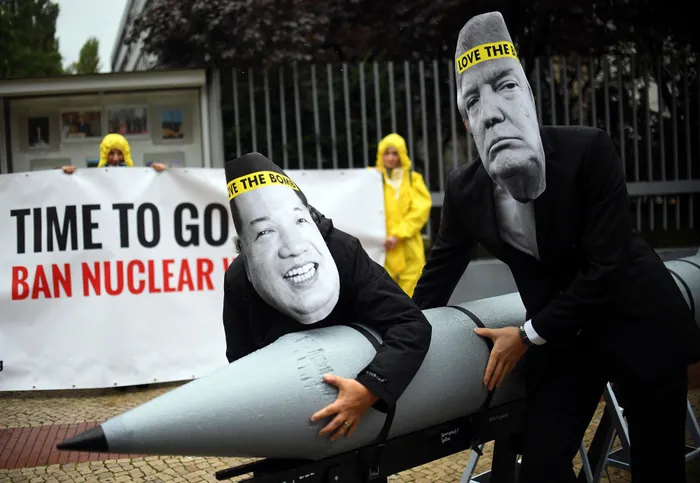
Activists of the International Campaign to Abolish Nuclear Weapons protest against the conflict between North Korea and the USA with masks of the North Korean ruler Kim Jong Un, left, and former US president Donald Trump, right, in front of the US embassy in Berlin. Picture AP
FAROUK ARAIE
Johannesburg - It is in the interests of global peace that a fair and balanced agreement is reached with Iran and the world community regarding nuclear non-proliferation.
It is purely an academic issue about Iran’s nuclear ambitions and intentions. Other non-nuclear countries could assemble nuclear weapons within two years if they choose to do so.
They are South Korea, Egypt, Japan, Brazil, Argentina, Germany and Australia.
According to reliable American and British intelligence reports, Iran has not yet decided to acquire nuclear weapons.
The irony of this whole nuclear saga is that Israel is a fully-fledged nuclear military power, and has a doctrine that envisages nuclear first and second strike capabilities from land, air and sea. It has an impregnable second strike capability based on its advanced German-built submarines.
It is a build-up concealed in stealth, aided by the West and shrouded by the policy of plausible denial.
It has also perfected neutron weapons and has sophisticated electromagnetic weapons {EMP} capability. According to a report in The Sunday Times of London, Israel has built at least 100 and possibly as many as 200 nuclear weapons.
A US nuclear scientist Dr Theodore Taylor stated that Israel has been a fully-fledged nuclear weapons state for at least 20 years.
Reliable reports from the CIA and Carnegie Endowment experts confirm in detail the capability of Israel’s nuclear arsenal that has a terrifying range, for a nation that denies its nuclear weapons capability.
In 1981, the Defence Minister Moshe Dayan publicly stated that the “Israelis are not going to be the first to introduce nuclear weapons into the Middle East”.
The implicit corollary is that neither will Israel be the second? Israel continues to update its nuclear arsenal outside the NPT regime.
Currently, it has around 300kg of high enriched uranium (HEU) and approximately 980kg of weapons-grade plutonium.
A nuclear bomb requires 12-18kg of HEU or 4-6kg of plutonium.
It is indeed tragic that The International Atomic Agency remains undisturbed by Israel’s nuclear capability.
Israel’s nuclear capability and it’s history are surrounded and characterized by ambiguity.
It is a proven fact that Israel has 90 plutonium, based nuclear warheads mounted on systems that are capable of vaporising over 20 major cities with a radius of over 1 000km.
Nuclear proliferation in this troubled arc of crisis will be an everlasting problem.
Related Topics: